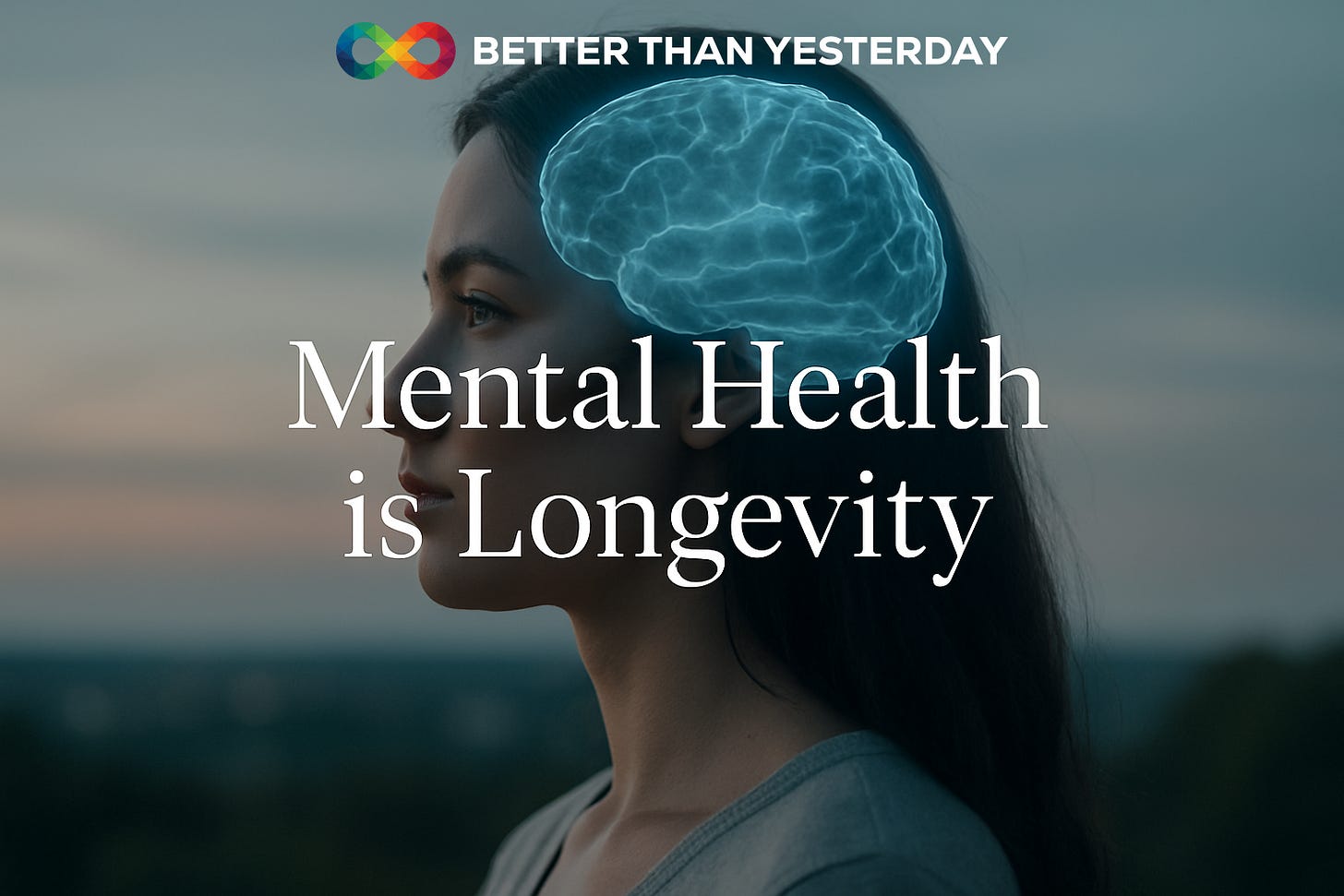Mental health can steal decades, but you can take them back
Most people think mental health is only about mood or therapy. The truth is bigger: your mental health shapes your lifespan.
Epidemiological studies show that depression, anxiety, and other psychiatric disorders can shorten life by 10–30 years. Not because of suicide alone, but because poor mental health accelerates aging and brings chronic disease earlier: heart disease, diabetes, cancer.
Here’s the part that doesn’t get enough attention: you can fight back. Lifestyle changes cut risk massively, and the benefits are even stronger in people living with mental illness.
Why mental health affects lifespan
Poor mental health doesn’t just change mood, it accelerates aging:
High cortisol and stress chemistry
Shorter telomeres
Chronic inflammation
Disrupted metabolism
Result: earlier onset of diabetes, heart disease, and faster biological aging.
On top of this, unhealthy habits like smoking, heavy drinking, and inactivity are more common in psychiatric disorders. They raise risk further, but also create huge opportunities for improvement when addressed.
What you can do today for better mental health and longevity
🌿 Move daily
Studies show regular physical activity lowers inflammation, reduces depressive symptoms, and cuts cardiovascular risk in people with depression and schizophrenia. Exercise is one of the most powerful antidepressants we have.
🥦 Eat nutrient-dense foods
Randomized trials of Mediterranean-style diets found significant reductions in depressive symptoms and improvements in metabolic health. Stable blood sugar equals a more stable brain.
😴 Prioritize sleep
Large cohort studies link less than 6 hours of sleep to a higher risk of early death. Cutting sleep is cutting years.
🚭 Quit smoking
Smoking explains a large share of early mortality in psychiatric populations. Quitting is associated with up to 10 years of added life expectancy. Stopping can literally add decades to life.
🍷 Keep alcohol moderate
Problematic alcohol use increases mortality risk. Studies confirm that moderation or abstinence lowers liver, cancer, and injury-related deaths.
🤝 Build social connection
Meta-analyses show people with strong social ties live longer, with effects comparable to quitting smoking. Strong relationships buffer stress and extend life.
🧘 Practice stress regulation
Meditation, breathwork, and structured stress-reduction programs reduce relapse in depression and improve resilience. Stress mastery is your hidden multiplier.
💊 Smart medical care
Research supports careful prescribing to minimize side effects, regular health monitoring, and integrating prevention into psychiatric care. Your doctor should measure more than mood.
Can lifestyle really matter with severe mental illness?
Yes. Lifestyle changes won’t replace therapy or medication, but they make everything work better.
Research shows the payoff is actually bigger for people with psychiatric diagnoses than for the general population.
Every workout, every night of sleep, every healthy meal is not just self-care, it’s life extension for people living with mental illness.
The Key takeaway
Mental health is not just about how you feel. It is the foundation of your lifespan.
If you want more years, protect your mind. Movement, food, sleep, connection, these are the real longevity levers.
Sources
Association of History of Psychopathology With Accelerated Aging at Midlife
A Prospective Study of the Association Between Lifestyle and the Risk of Depressive Symptoms
Association of Early-Life Mental Health With Biomarkers in Midlife and Premature Mortality
Major Psychiatric Disorders, Substance Use Behaviors, and Longevity
Healthy Lifestyle and Risk of Incidence, Mortality and Life Expectancy of Mental Disorders
A Healthy Lifestyle Is Positively Associated With Mental Health and Well-Being



